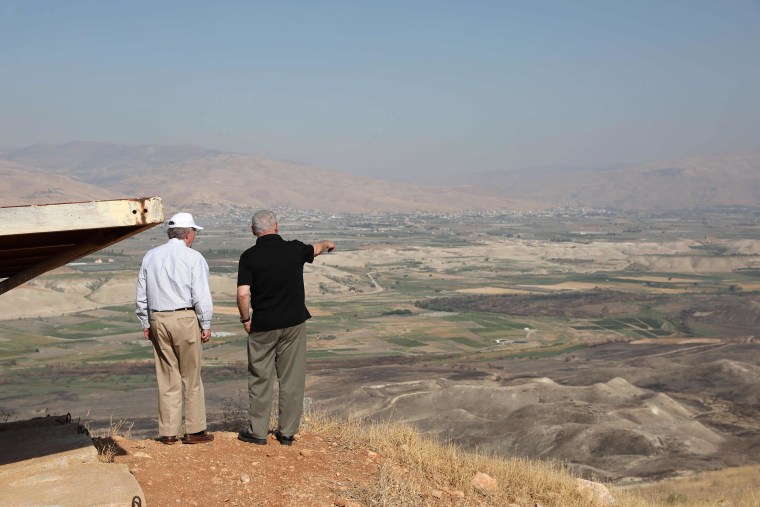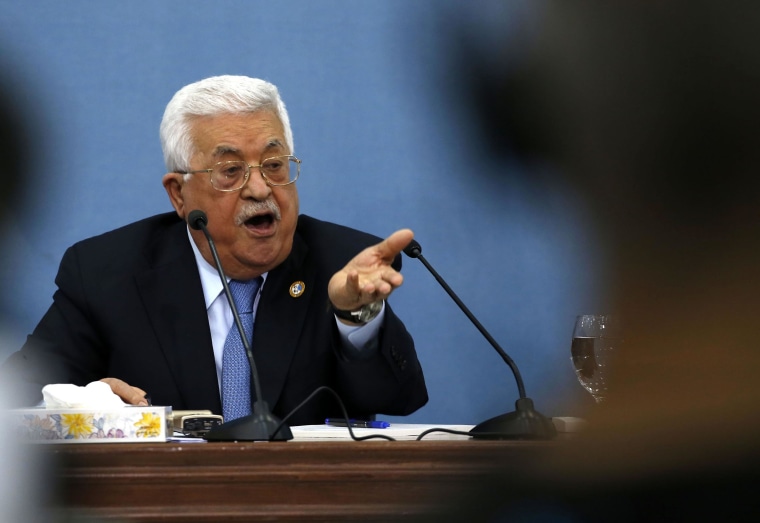Days before Jared Kushner was due to kick off the economic half of his Mideast peace plan Tuesday, Israeli Prime Minister Benjamin Netanyahu whisked U.S. national security adviser John Bolton off on a helicopter tour of the West Bank’s Jordan Valley.
Speaking during the trip through the area, which runs along the easternmost part of the Israeli-occupied West Bank near the border with Jordan, Netanyahu told reporters that maintaining an Israeli presence there should be part of any peace agreement.
Responding to the prime minister’s remarks, Bolton said the Trump administration would take the prime minister’s concerns “very much into account.”

The pictures of the tour, whose participants also included U.S. Ambassador David Friedman, will have served as a potent symbol of occupation for many Palestinians, and underlined their near-unanimous rejection of the conference in the Bahraini capital of Manama.
This rejection comes despite the Kushner plan’s goal of funneling billions of dollars into the ailing Palestinian economy in the blockaded Gaza Strip and the West Bank.
Billions of dollars aren’t going to resolve the decadeslong impasse, according to Palestinian Authority leader Mahmoud Abbas, who said the American plan is biased toward Israel and also neglects Palestinian political aspirations.
Focusing on economic issues “is unacceptable before the political solution is discussed,” he told top officials of his Fatah party Sunday.

While the Trump administration is touting the business opportunities, there has been little clarity over the political side of things. The administration has said a political half is coming, but has refused to put a date on when that would be released.
The Trump administration has already strongly hinted that it is willing to abandon longstanding U.S. policy supporting a two-state solution to the Palestinian-Israeli conflict — adding to the profound disillusionment of many Palestinians.
Friedman added fuel to the fire when he told The New York Times earlier this month that Israel had the right to annex at least some of the West Bank.
More than 3 million Palestinians live in the West Bank and east Jerusalem along with close to 620,000 settlers who moved to the territories in the years after Israel captured the area in the 1967 Arab-Israeli war.
Bolton’s comments during his tour of the Jordan Valley on Sunday offer further proof that the Trump administration was “singing from Netanyahu’s hymn sheet,” said Yossi Mekelberg, a professor of international relations at Regent’s University, London, and a senior consulting research fellow at the Chatham House think tank.
While land swaps may be included as part of an agreement, unilateral annexation of occupied land contravened international law, he added.
Politics vs economics
Under the Kushner plan, donor countries and investors would funnel in about $50 billion into the region. Around $28 billion would go to the Palestinian territories, as well as $7.5 billion to Jordan, $9 billion to Egypt and $6 billion for Lebanon.
"I laugh when they attack this as the ‘deal of the century,’" Kushner told Reuters, referring to President Donald Trump's claim for the plan. "This is going to be the ‘opportunity of the century’ if they have the courage to pursue it."
Jason Greenblatt, Trump’s special envoy for peace talks, suggested to the editor of the Jerusalem Post last week that the publication of the long-awaited plan could be delayed until November following crucial elections in Israel.
“There’s a lot of talk that we’re trying to buy the Palestinians off, that this is merely an economic peace, that’s completely untrue,” he also told Israel’s Channel 12 News last week.
Mekelberg said Trump’s approach to the Palestinian issue since taking office did not “instill confidence among the Palestinians.”
Last year, Trump moved the U.S. embassy to Jerusalem and halted funding for UNRWA, the United Nations agency that has supported Palestinian refugees for seven decades, as well as other projects — deepening the hardship and desperation of millions of Palestinians in the blockaded Gaza Strip, occupied east Jerusalem and the West Bank.
The White House has also closed the Palestinian diplomatic office in Washington. In March, Trump endorsed Israel’s annexation of the Golan Heights from Syria.
On the streets of the city of Ramallah in the West Bank on Monday, protesters rejected Kushner’s 40-page plan that is set to be discussed in full with Arab leaders in Bahrain on Tuesday and Wednesday.
“We don’t need money, we need to get rid of the occupation. Palestine is not for sale,” said Khaled Mansur, 60, a Palestinian who was among the thousands protesting.
Fawaz Gerges, a professor of Middle Eastern politics at the London School of Economics and Political Science, said the Bahrain conference had “exposed” that the peace plan was about providing the Palestinians with economic help in exchange for giving up their aspirations to establish a Palestinian state.
In the process, he said, Trump was dismantling decades of an international consensus and empowering “ultra-nationalists” in Israel.
Hady Amr, who served as deputy special envoy for Israeli-Palestinian negotiations under President Barack Obama, said the fundamental problem with the Palestinian economy was not a shortage of investment but a lack of freedom and sovereignty. He pointed to the blockaded Gaza Strip, where some 1.8 million people live in an area twice the size of the American capital.
“Imagine a city like Washington, D.C., or London that was literally walled off from the world and people could not enter or exit,” he said. “How could the economy function in a world like the one we have today?”
'Running out of time'
Then there’s the fact that the main protagonists in the conflict are not even at the conference since the Palestinian Authority is boycotting the event. Greenblatt confirmed last week that the Trump administration had decided that the Israeli government should also not attend.
The conference will instead include a collection of low-ranking officials from Arab countries and a handful of private Israelis and Palestinians.
While Israeli politics remains uncertain ahead of elections this fall, the Palestinian leadership is also divided between the Palestinian Authority in the West Bank and the militant group Hamas, which controls Gaza.
And then there is how late in the U.S. election cycle such a rollout would come — just a year before U.S. presidential elections. So the current White House would have very little space to maneuver and cajole, with different parties preferring to play for time than deal with an administration that could be on its way out.
“This administration is running out of time and has run out of ideas,” Mekelberg said.
Saphora Smith reported from London. Lawahez Jabari reported from the West Bank and Paul Goldman reported from Tel Aviv.

